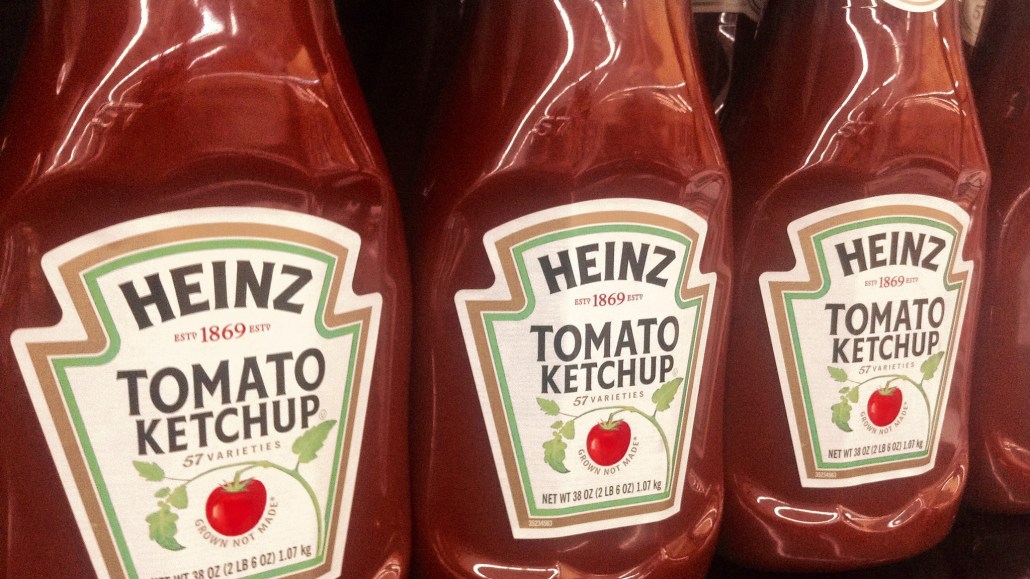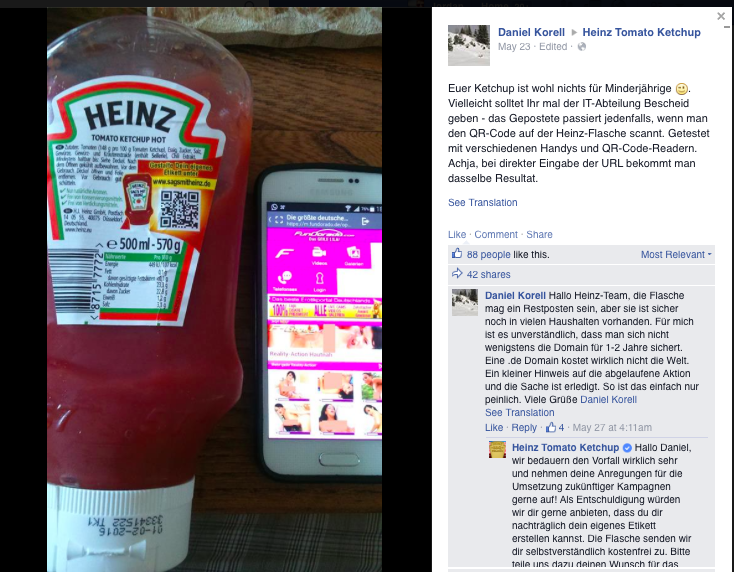Secure your place at the Digiday Media Buying Summit in Nashville, March 2-4

Heinz, the condiment maker, is finding itself in a bit of a pickle today after accidentally making QR codes interesting.
First let’s catch up, the part of the story we relish: A QR code on a bottle of Heinz ketchup in Germany purported to direct the user to a landing page for a label redesign contest. A fellow named Daniel Korell actually took the bait and scanned the bottle, hoping to enter the competition.
Only, that … didn’t happen. Instead, Korell was led to the German porn website Fundorado, which opened a bunch of tabs playing NSFW videos. He posted the evidence on Heinz’s Facebook page writing the code “probably isn’t for minors.”
The company responded explaining that the contest, which ended last year, accidentally pointed to an expired domain. Heinz said it “really regrets” what happened and offered to send him his own custom-designed ketchup bottle for free if he wants.

Not to be outdone, Fundorado commented on the Facebook thread offering him a year’s free subscription.
Heinz isn’t the first — nor is it, we hope, the last — brand or publisher to accidentally expose its customers to porn.
A review:
Twitter has been especially troublesome for companies and people. Last year, US Airways broke the Internet when it tweeted a picture of a toy plane sticking out from a woman’s, um, landing strip. The airline apologized and blamed a botched copy-and-paste job, but it will be forever etched in our minds.
Prior to that, ESPN college football analyst Gerry Hamilton accidentally posted a link to a NSFW video in one of his tweets that was clearly meant to link somewhere else. (The same thing happened to Miami Herald’s Dolphin beat writer Adam Beasley when one his tweets also linked to porn.)
Tweeting porn appears to be a regular past time on local television station feeds, too. Time Warner Cable News in Austin inexplicably posted gay porn in a tweet that was supposed to pertain to traffic and the CBS affiliate in Memphis posted a link to porn instead of to its radar.
Sometimes the porn isn’t even accidental. Australian coffee company Fresh One brewed controversy for its explicit ads that depicted women in sexually objectifying positions. “Grind me, bathe me in hot steamy water, moisten me with cream if you must. Have it your way, any way, a mouthful of my beans will leave you in ecstasy,” one of the ads read. The company, however, didn’t bow to pressure and kept running the ads.
In the early 2000s, Pony used porn stars such as Jenna Jameson to promote its line of athletic shoes. The campaign didn’t last long and was dropped a few months after it began.
More in Marketing

Thrive Market’s Amina Pasha believes brands that focus on trust will win in an AI-first world
Amina Pasha, CMO at Thrive Market, believes building trust can help brands differentiate themselves.

Despite flight to fame, celeb talent isn’t as sure a bet as CMOs think
Brands are leaning more heavily on celebrity talent in advertising. Marketers see guaranteed wins in working with big names, but there are hidden risks.

With AI backlash building, marketers reconsider their approach
With AI hype giving way to skepticism, advertisers are reassessing how the technology fits into their workflows and brand positioning.





